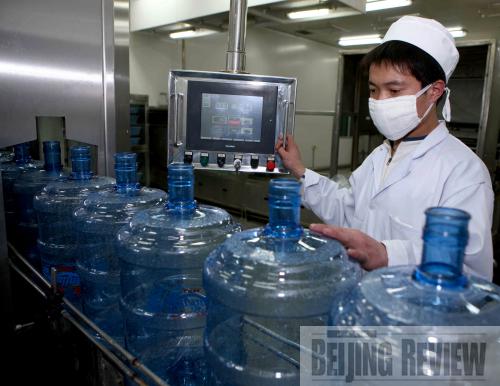|
 |
|
QUALITY MATTERS: The safety of bottled drinking water in Chinese cities is now a major public concern (CHEN JIANLI) |
Give SMEs a Slice
Small and medium-sized enterprises (SMEs), which make up 99 percent of all enterprises in China, now contribute 60 percent of the country's gross domestic product and provide three quarters of jobs in Chinese cities. They have therefore been considered a major driving force for the sustained development of the national economy.
The sweeping global economic crisis, however, hit SMEs the hardest. A report released by the Chinese Academy of Social Sciences shows that 40 percent of China's SMEs have gone out of business as a result of the crisis.
We need to attach importance to SMEs that are in dire need of a slice of the government's stimulus funds. In the past, China's SMEs obtained much less support than fewer big state-owned companies and monopoly enterprises.
According to the Ministry of Industry and Information Technology, only less than 5 percent of the 4.8 trillion yuan ($702 billion) of new loans in the first quarter of this year went to SMEs.
To pull the SMEs out of their financial difficulties, diverse measures should be taken. For example, central and local governments should intensify support to loan guarantee companies so that they can cover a wider range of SMEs.
The country should also provide more preferential taxation and support policies for SMEs and also come up with a stimulus package exclusively for them.
Chinese Business View
Freedom Needed
Last November, Ruijin, in central China's Jiangxi Province, initiated a new policy that requires village and township officials to escort dissatisfied local residents through the process when the latter complain to higher-level governments. Maybe this is well intentioned. However, of the 496 visits in the first quarter of this year, only 19 were in the company of local officials. Most people still preferred to visit higher-level governments secretly on their own.
In some places, in order to prevent local scandals from being exposed, especially to upper-level governments, officials even persecute those who submit petitions. Yet if the community doesn't get satisfaction from local government, they have no other choice but to go above their heads for help.
Why do some people visit upper-level governments, despite all the hardships and difficulties involved? To a large extent, it should be blamed on relevant government agencies' inaction and sometimes conflicts of interest between officials and these people.
In most cases, officials are not as impartial as they are believed to be. That's why only a very small fraction of petitioners accepted officials to accompanying them.
Guangzhou Daily
No Place for Bullies
The Association of Bottled Drinking Water Producers of Guangxi Zhuang Autonomous Region recently published results of a sample survey on the quality of bottled water, which said products of six local companies in Guilin failed to meet the national standards for drinking water.
The six accused companies immediately challenged the announcement, saying the survey was not conducted in line with conventional procedures. They also said in a joint declaration that officials with the association had asked them to pay up to 5,000 yuan ($720) to have their names removed from the blacklist, but they all refused the request. Finally, a head of the association admitted that the name-and-shame list was published without approval.
It is really shocking that in this case, people's food safety concerns became an opportunity for some people to prosper illegally.
While curbing the rampant abuse of administrative power, it is also important for businesses to expose scandals. When businesses have developed this kind of awareness, corrupt officials will no longer be able to bully their way around the manufacturing arena.
Xinmin Evening News
Give Kids a Break
Summer vacation is for children to take a break from the routine of school. But those with an eye on opportunities to make money are always quick to set up all kinds of paid training classes for the often-exhausted children.
This year, education authorities in various provinces again issued bans on paid training classes for schoolchildren during the summer vacation before spring semester classes ended in early July.
However, what happened in previous vacations proved that bans on paid training classes were always a failure.
What should not be neglected is that after issuing their bans, education authorities did not take effective measures to enforce them. Some education officials even encouraged their relatives to open paid training classes during vacations. How could anyone then expect the bans to be thoroughly implemented?
Education for all-around development has always been advocated in China, but exam-oriented education still prevails. To completely change the situation, education authorities must step up the clampdown on paid training classes and cram schools during school holidays.
Guangming Daily | 